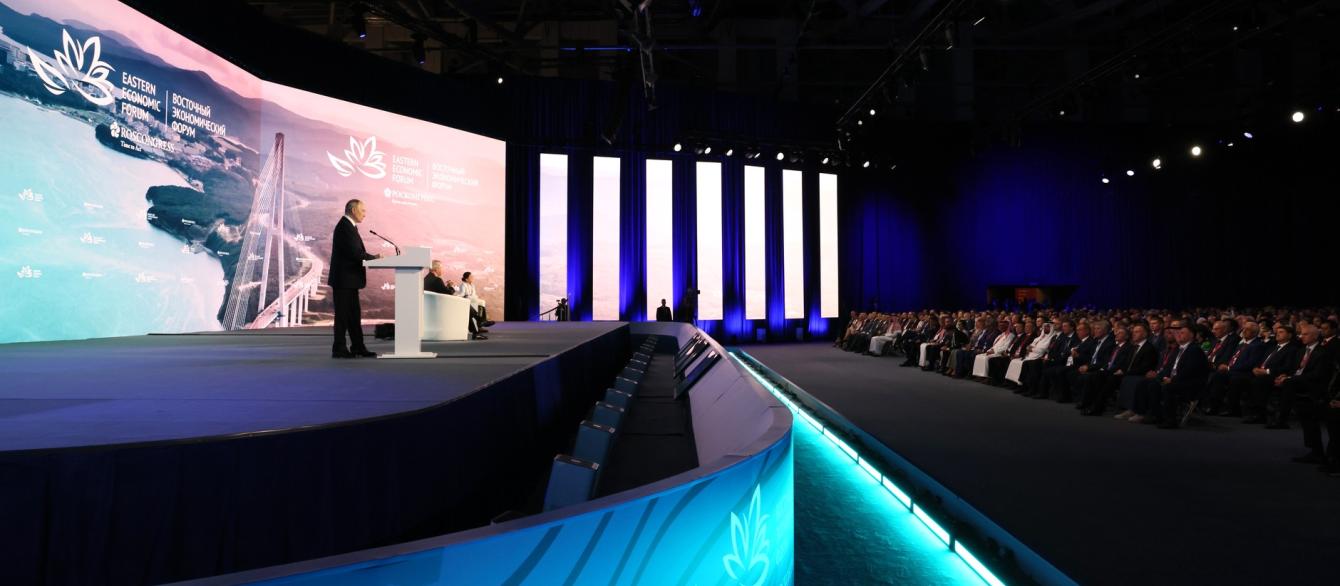This article originally appeared on the Russia Matters website with the headline "Is Russia Shifting Toward Mobilization Economy or Forming New, Loyal Business Elite?".
The events of recent months clearly show that, contrary to all previous statements by Russian President Vladimir Putin, the Kremlin has set a course for reviewing privatization deals and, more broadly, for the redistribution of property in the Russian economy.
There are three plausible explanations for what is driving this process, which rather complement each other:
1. It is traditional for Putin’s Russia to use “power resources” to redistribute private property.
2. An overall shift to the “mobilization economy” model (like in Josef Stalin’s time).
3. Changes in the composition of the business elite (with the exclusion of not-quite-loyal-enough entrepreneurs and the provision of their assets to a “new generation of businessmen” who are fully loyal to the Kremlin).
The value of the assets of private companies that the authorities have nationalized or attempted to nationalize over the past two years exceeds 1 trillion rubles (about $15 billion). At the same time, privatization was going on in parallel; however, income from it in 2022-2023 amounted to only about 30 billion rubles (about $500 million). One cannot say that this process is radically changing the ownership structure. For example, the capitalization of the Russian stock market in 2023 was about 57 trillion rubles (about $650 billion). However, the forms in which the seizure of property occurs from the summer of 2023 — and in particular the actual waiver of the statute of limitations for the criminal cases on violations committed during privatization — cause great tension among large Russian businesses, as well as among members of the economic Cabinet in the government. What are the drivers and aims of this "de-privatization" and what are the effects of this process?
The cases of Danone, chemical industry enterprises, or the Rolf company allow us to see that the interests of very specific private actors are often behind the "de-privatization" process. Possessing a “power resource,” these actors gain control of the assets of nationalized enterprises. This practice has been widely known in Russia since the 2000s, although previously it was mainly expressed in the use of fictitious criminal cases against existing owners of assets to transfer them to other private owners.
At the same time, the public reaction of the authorities to such actions to “seize assets” is important. Until 2023, Putin regularly announced the fight against such abuses of business by law enforcement agencies. However, since 2023, such actions have increasingly become explained by the protection of “national interests.” In this regard, two lines can be noted.
The first is a bet on the “mobilization economy” model, which Izborsk Club experts have been talking about since 2013. Izborsk Club was founded in fall 2012 by the group of Russian ultra-conservative intellectuals with informal support from the Kremlin. Among the founding members of Izborsk Club were nationalist writers Alexander Prokhanov and Maxim Kalashnikov, far right philosopher Alexander Dugin and economist Sergei Glaziev. In the beginning, Izborsk Club played quite a marginal role in the Russian intellectual landscape but had already become more influential before the full-scale invasion to Ukraine.
At the political level, the most prominent representative of the “mobilization economy” model is the chairman of the Investigative Committee and Putin’s former classmate at the Leningrad State University, Alexander Bastrykin. In May 2023, at the Legal Forum in St. Petersburg, he publicly advocated the nationalization of the main sectors of the Russian economy “for the sake of economic security in war conditions.” This approach is substantiated in detail in the book “Growth Crystal,” co-authored by former federal minister for development of the Russian Far East Alexander Galushka and published in 2021. A large PR campaign was aimed at public promotion of this book, extolling the successes and virtues of the Stalinist economic model. It is also worth emphasizing that claims for "de-privatization" are initiated by the Prosecutor General’s Office, headed by Igor Krasnov, who has been Bastrykin’s closest employee for more than 10 years.
The second line is a course toward changing the composition of the business elite. Nationalization or the threat of nationalization is used to squeeze out of the economy entrepreneurs who do not demonstrate sufficient loyalty to the Kremlin. Signs of this can be considered the lack of direct public support for the war in Ukraine or the owners’ residing abroad (the nationalization of Russia’s biggest pasta producer Makfa in April 2024 is one example). At the same time, using their assets, the Kremlin wants to form a completely loyal and dependent business elite. Personally, this line seems to me the dominant one in the Kremlin’s policy. In this regard, Putin's public statements are characteristic. Already in September 2023 at the Eastern Economic conference, denying the course toward de-privatization, he said that “the emergence of a new, young class of businessmen is in demand.” Then in February 2024, in his address to the Federal Assembly, Putin directly stated that the elite are those who serve Russia, and not those who “filled their pockets in the 1990s.” It is obvious that the latest attack was clearly addressed to the oligarchs of the Yeltsin period. Putin’s speech at the congress of the Russian Union of Industrialists and Entrepreneurs (RSPP) on April 25, 2024, could hardly dispel their fears:
Putin: “Law enforcement agencies have opened a number of cases to return some assets to state ownership. I would like to emphasize: We are not talking about revising privatization, but about cases where the actions or inaction of the owners of enterprises cause direct damage to the country’s security and national interests.”
Alexander Shokhin, President of RSPP: “To be honest, I was surprised why there was no stormy applause, turning into a standing ovation, because today you formulated it very clearly.”
Putin: “I can tell you why there was no applause. Because the actions of law enforcement agencies, despite our conversations, continue. So there’s no applause.”
It is important to understand that the real scale of property redistribution within this “second line” is by no means limited to court decisions on nationalization. The owners of foreign companies who decided to continue their business in Russia after the start of the war did not encounter significant problems until mid-2023. However, against the backdrop of the nationalization of the Danone and Baltika companies, in recent months, they began to receive offers to sell their assets at prices three to four times lower than their real value. It is interesting that such proposals come from people who are unknown in the Russian business environment and do not have any kind of reputation. At the same time, the arguments of these buyers are very simple: “Well, you see what’s happening. Sell us your business while you still have the chance. Otherwise they’ll just take it away.” That is, representatives of any business with attractive assets without sufficient “political” connections become the object of forceful pressure. As one of my counterparts in Moscow recently put it: “They used to come for those who somehow supported the opposition, but now they came for non-party people.”
The economic and political consequences of this process may be different. The redistribution of property will most likely lead to a decrease in the stability of the Russian economy. With high probability the new owners, who obtained their assets virtually through robbery, will not have sufficient competencies to effectively manage these assets. At the same time, the Kremlin’s blatant disregard for property rights will create barriers to investment in business development. However, it is important to recognize that companies that are now targets for takeovers typically have fairly well-established current business processes. At the same time, international financial sanctions prevent capital flight and, in a sense, force businesses to invest in Russia.
In this context, the political consequences of nationalization seem more important. This process certainly creates serious threats for many entrepreneurs (and especially for the oligarchs of the Yeltsin period). Therefore, nationalization could become one of the factors destabilizing the Putin regime, especially if business turns out to be capable of collective political action. For example, this was the case in early 1996 on the eve of the presidential election, when the risks of Yeltsin’s defeat led to business consolidation. Another example is business collective action after governmental default and deep devaluation of the ruble in August 1998 led to political crisis and the return of communists to the government for the first time since the collapse of the USSR. However, at that time, Russian big business understood the alternatives. And now Russian entrepreneurs do not see clear alternative to the regime.
This problem stems from the fact that the opposition does not have a realistic “vision of the future” in which today’s business elite could see a place for themselves. Against this background, the likelihood of collective political action by business still seems very low, and in the short term, one can expect a redistribution of assets in favor of entrepreneurs loyal to the Kremlin. A comparison can be made here with the expropriation of Jewish business assets in Nazi Germany in the 1930s. At the same time, it is important to realize that the more consolidated the elite is, the more stable the regime will be. Therefore, it is important for the U.S. and EU to send signals addressed to the Russian business world about what kind of “Russia after Putin” the West would be willing to interact with and what actions by Russian businesses could contribute to the movement toward such a new Russia.
The opinions and analysis herein are solely those of the author.






